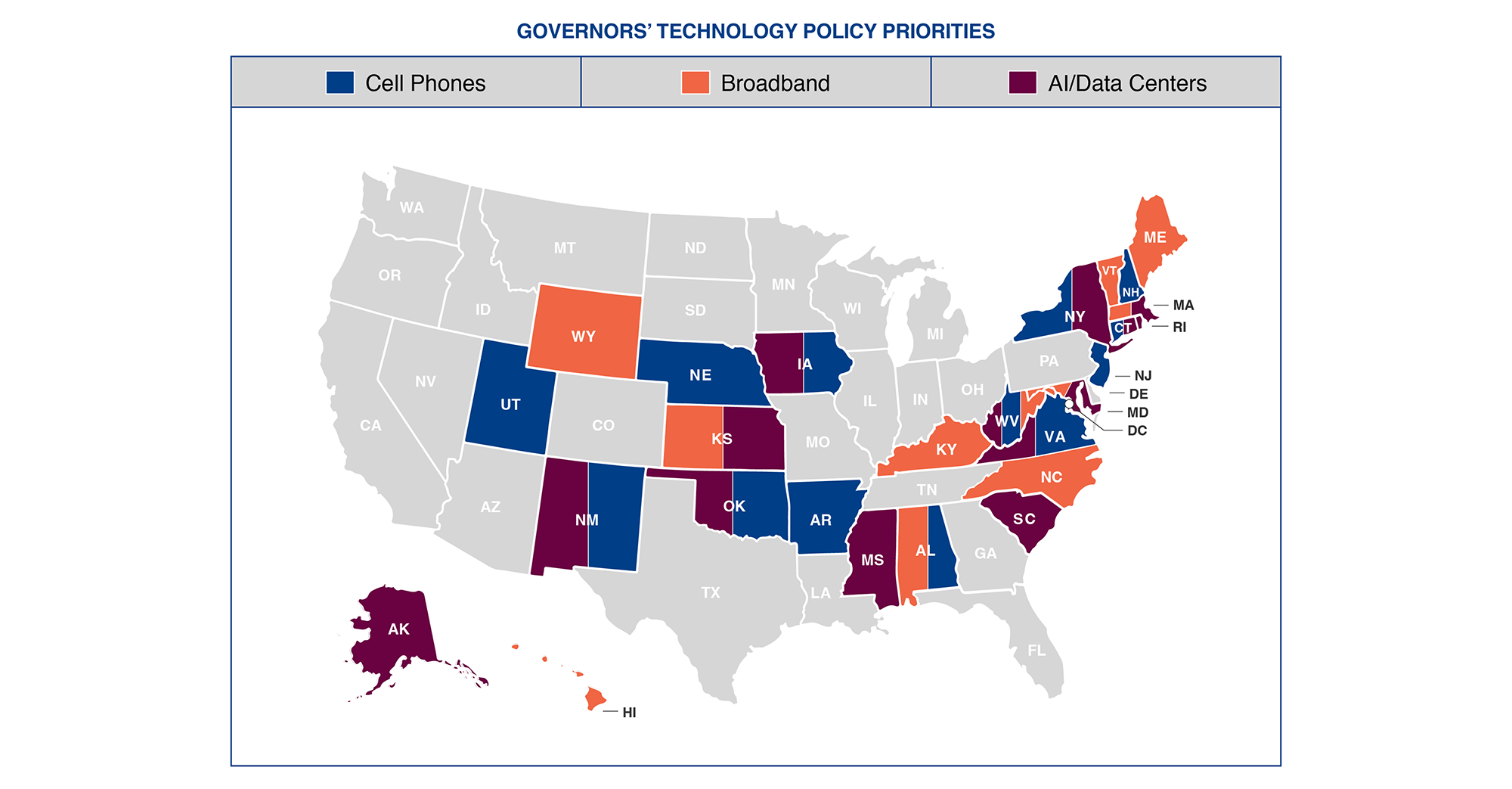States are increasingly leading the way in their efforts to regulate — and harness — the technology that impacts our daily lives. As governors prepare to make their annual pilgrimage to Washington for the National Governors Association’s Winter Meeting, Feb. 20-22, we examined their State of the State addresses for clues about the top technology-related policy trends for 2025.
So far, 43 governors have delivered a State of the State address to outline their agenda for the year. Based on our analysis, governors’ technology priorities can be grouped into three primary areas: banning smartphones in schools, competing for AI and data center investments, and expanding high-speed internet access.

Cell Phones & Social Media
The big loser this year? Cell phones. Thirteen governors announced initiatives to limit or ban cell phones in classrooms, often linking them to the harmful effects of social media on kids.
Newly elected New Hampshire Governor Kelly Ayotte pledged to ban phones in schools in her inaugural address.
“Screens are negatively impacting our learning environments, drawing students' attention away from their classes, and becoming a barrier for teachers to do their jobs,” said Ayotte. “No more.”
In Nebraska, Governor Jim Pillen backed a package of bills to “protect children from the harms of social media, ban phones in classrooms, and fix our child pornography laws to include AI-generated images.”
New York Governor Kathy Hochul took a victory lap after signing the Stop Addictive Feeds Exploitation (SAFE) for Kids Act last year.
“When we took on social media giants, stood up against an army of lobbyists and lawsuits and we won, it was to stop the addictive feeds that put corporate profits over your children’s mental health,” said Hochul.
AI & Data Centers
Technology providers have long relied on data centers to store and process massive amounts of data securely and efficiently. The rapid evolution of artificial intelligence (AI) technology has fueled an even greater demand for data center infrastructure, computing power, and energy.
Nine governors mentioned AI in their speeches, and five more touted data center investments to support high-tech industries.
In Virginia, home to more data centers than any other state, Governor Glenn Youngkin struck an ambivalent tone, acknowledging local pushback against data center development while crediting the industry for supporting 74,000 jobs and generating revenue for the commonwealth.
Governor Maura Healey, who last year launched the Massachusetts AI Hub, doubled down on her goal of making Massachusetts the center of AI innovation.
“States will either help steer AI’s impact, or they will struggle to keep pace,” said Healey. “In Massachusetts, we pioneered the science for AI. I want us to lead and for Massachusetts businesses and workers to get the benefit.”
Elsewhere, governors addressed the precipitous demand for reliable and affordable energy to serve new data centers.
“Every business thinking about expanding in Connecticut or moving here asks about — no, not incentives — but the reliability and affordability of our electricity, as everything we do gets more energy intensive,” said Connecticut Governor Ned Lamont.
Broadband
States — bolstered by federal funding from the American Rescue Plan Act of 2021 and the Infrastructure Investment and Jobs Act — made significant investments in high-speed internet connectivity last year.
Eleven governors highlighted their progress on expanding broadband access, from connecting 80,229 homes and business in Kentucky to 142,000 in Alabama.
“We know that the internet is no longer a luxury,” said Kentucky Governor Andy Beshear. “It’s a necessity for education, health care, and for our economy.”
One prediction for 2026: Expect broadband infrastructure to be a top theme again as states and territories dole out more than $40 billion in Broadband Equity, Access, and Deployment (BEAD) Program grants to reach their remaining un- and underserved residents. (That is, unless BEAD finds itself in the crosshairs of the Trump administration. Elon Musk, the majority owner of satellite internet service provider Starlink, has been an outspoken critic of the program.)
More from Stateside:
Contact Robert Williams for more information about state technology and telecommunications issues.
